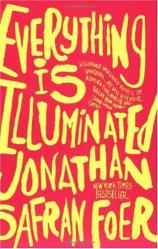Everything Is Illuminated
Review
Everything Is Illuminated
Warning: The reading of this book may cause intense desire to join a book group and discuss --- gasp --- actual themes.
In EVERYTHING IS ILLUMINATED, the talented author Jonathan Safran Foer introduces the reader to the fictional character Jonathan Safran Foer, an American who journeys to Ukraine in search of the woman he believes saved his grandfather's life during World War II. Foer is not the primary narrator on this trip --- that distinction goes to Alex, a bravura Ukrainian young man who turns out to have many issues of his own.
Alex acts as translator for Jonathan during his journey, on which he's also accompanied by Alex's grandfather, their erstwhile near-blind chauffeur and grandpa's dog, Sammy Davis Junior, Junior. The odd foursome travel to the place where Jonathan's grandfather grew up, only to find there's almost nothing left. This forces Alex's grandfather to confront a past that nearly all World War II survivors are desperately trying to forget and ultimately leads to Alex making some bold decisions of his own.
Back to the book group, though. More than anything, Foer, the author, is a fan of language. The skilled humor with which he presents Alex's passages (during which the Ukrainian's attempt at English slang and literal interpretation is harder to pull off than it seems) is amazing. Where else, in the year 2003, can you find a young man talking about how much he "digs" girls, or hear someone describe an effort to "KGB" on another … err, spy? The book within a book about Jonathan's relatives combines the elements of magical realism and folklore into a satisfying story. When all three parts of the novel are combined --- Alex's correspondence with Jonathan, Alex's account of the trip and Jonathan's story about his family --- it's a compelling read, one that must be discussed with others to make sure nothing has been missed.
However, there are some flaws. Foer's use of himself as the lead character can be read as a bit grating; just how cute can you get? The novel did arise out of Foer's real-life trip to Europe, so where fact and fiction meet is anyone's guess. Plus, it seems strange for Alex's epiphanies about their trip to take so long to come to fruition. After all, the trip has been finished for months by the time he finally reaches some conclusions.
Yet, these structural errors are nothing compared to Foer's gift for words and original storylines. Throughout the book, it's tough not to keep repeating, "This guy's only 25." His talent for observation and dry, unusual comparisons keep the book buzzing along. And even if, in the end, nothing it seems is completely illuminated, that is OK. The book group should help clear things up.
Reveiw #2 by Becky Ohlsen
The paperback edition of EVERYTHING IS ILLUMINATED contains 24 drooling quotations from worshipful critics --- one for each year its author had lived when the novel was first published. But the only one you should take seriously comes from the London Times: "You will have to ignore everything you read about this novel.... You won't believe it and you'll decide not to read the book on principle. And that would be a disaster, because it's all true." Jonathan Safran Foer's debut novel (he also edited A CONVERGENCE OF BIRDS: Original Fiction and Poetry Inspired by Joseph Cornell) won the type of critical adoration almost guaranteed to backfire. You hear all this praise from Joyce Carol Oates, Isabel Allende, Jeffrey Eugenides and you think, "How can it possibly be THAT good?" Certain you'll be disappointed, you decide the novel must be overrated, or the author's just a well-connected little snot, or the whole thing's some kind of marketing ploy, so you curl up with your well-thumbed copy of THE SUN ALSO RISES instead.
Unless.
OK, so there are two reasons you might not read this book. One, the hype puts you off. Two, you have no soul. See, here's the thing: If you're curious enough about the hype to peek at the first page of the novel --- titled "An Overture to the Commencement of a Very Rigid Journey" --- and you STILL don't want to read the book, then you have no soul. Honestly, what reader could fail to be charmed by the amazing prose of Alex Perchov, a young Ukrainian "translator" whose grasp on the English language is fierce but undeniably skewed? (Sample: "...he is always promenading into things. It was only four days previous that he made his eye blue from a mismanagement with a brick wall.")
Alex has been pressed into service by his father, a tour guide, to act as translator for an American visitor named Jonathan Safran Foer. Jonathan is on a quest to find the woman he thinks may have rescued his grandfather from the Nazis. The novel is told in pieces, as Jonathan and Alex each write their own stories and exchange chapters by mail after Jonathan's return to the U.S. This allows us to hear about both Jonathan and Alex's wild family in Alex's inimitable voice (his violent father, "very, very humble" mother, beloved brother Little Igor and supposedly blind grandfather who nevertheless drives and watches television and of course the grandfather's deranged "seeing-eye bitch," Sammy Davis Junior Junior), while the historical sections are written by Jonathan, later to be translated by Alex. Since "Jonathan" is mostly a tangential presence, or at any rate a character in Alex's story, the book neatly avoids sounding like your typically self-absorbed first novel --- a difficult feat for anyone, much less a 24-year-old author like Foer.
As the novel progresses and the two characters' stories develop, you start to feel that Alex's reverence for "the hero," as he calls Jonathan, is misplaced and, that if there's anyone who deserves to be called the hero of this story, it's Alex. If there's anyone who should be winning praise for the raw genius of his writing, it's Alex. But then you remember that Alex was, of course, written into existence by none other than...Jonathan. This means that, in fact, all the praise was deserved all along and the author himself --- the real author, Jonathan Safran Foer --- is the true hero.
Reveiw #3 by Rob Cline
EVERYTHING IS ILLUMINATED opens as a laugh-out-loud farce and closes as a weep-aloud, but cautiously redemptive, tragedy. The journey between the two features a pair of startlingly inventive and related narratives, as well as a series of letters that serves as internal textual criticism. The result is a novel that is extremely impressive, both in terms of the risks it takes and the successes it achieves.
The book's two storytellers are Alex --- a Ukrainian who serves as an earnest but linguistically challenged translator --- and a Jew who, like the author, is named Jonathan Safran Foer. Alex is writing the tale of his adventures with his grandfather and Jonathan when they searched rural Ukraine for an important link in Jonathan's family history. Jonathan is writing an account of that family history, which is related in the style of magic realism. At stake is an understanding of the vagaries of life and love, as well as a reckoning with events that took place during the Nazis' invasion of Ukraine.
Alex's fairly straightforward story is rendered in fractured and hilarious English that temporarily masks the essential sadness of his tale: "I had performed recklessly well in my second year of English at university. This was a very majestic thing I did because my instructor was having [expletive] between his brains." Jonathan's mystical account of his family's history in Ukraine is also a delight to read, but it is a dark tale that turns gradually darker: "It was March 18, 1791, when Trachim B's double-axle wagon either did or did not pin him against the bottom of the Brod river." In the end, both stories descend into real-life tragedy as accounts of the Nazi invasion enter the narrative.
The two writers exchange chapters of the text and Alex comments on both in his letters to Jonathan. These letters, written in Alex's inimitable style, explore issues considered in both stories, examine symbolism and consider the role of fiction and the responsibility of writers. This running commentary, combined with a wide array of religious images and symbols, lend EVERYTHING IS ILLUMINATED a sacred feel, despite the novel's farcical elements and the occasionally graphic violence and sex.
EVERYTHING IS ILLUMINATED is a richly rewarding novel that takes the reader through a gauntlet of emotions. Both the laughter and the tears seem an inadequate response to a novel of this much reach and daring.
Reviewed by Rob Cline([email protected]) on January 21, 2011
Everything Is Illuminated
- Publication Date: April 1, 2003
- Genres: Fiction
- Paperback: 288 pages
- Publisher: Harper Perennial
- ISBN-10: 0060529709
- ISBN-13: 9780060529703










